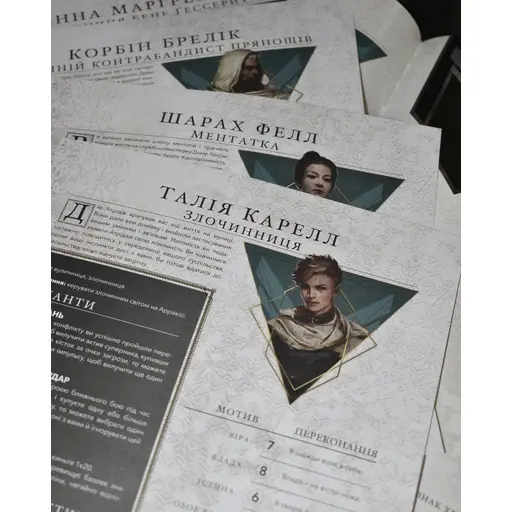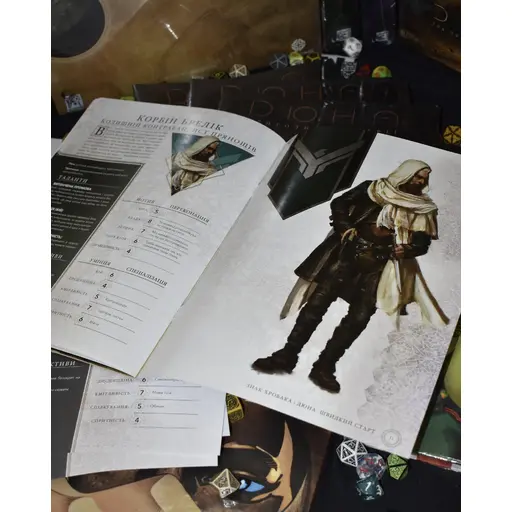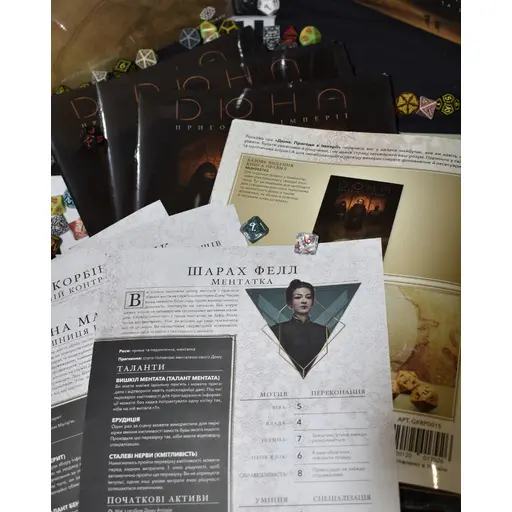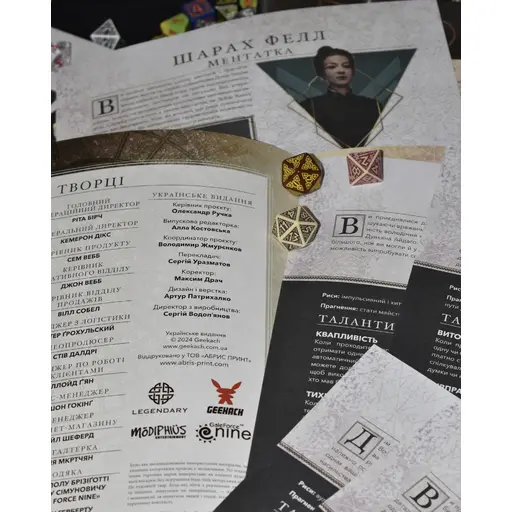Dune - Wormsign. Quickstart Guide
Adventures in the Empire begin!
Here is a quick start booklet for the board role-playing game «Dune - Adventures in the Empire», which contains the basic rules, the starting adventure «Mark of the Worm» and six ready-made characters. In addition to the booklet, you will need twenty-sided dice (usually two, but sometimes the required number increases to five), any tokens (to track impulse, determination, and threat points), paper with a pen / pencil, and characters.
The adventure «Mark of the Worm» is designed to introduce players to the Dune universe, although there is probably no ardent fan of the world who would not be happy to play the Dune role-playing game as a nightingale.
Basic rules of the system:
Simple check
The game is based on the 2d20 system, so you will roll two twenty-sided dice, trying to perform various actions.
Skills
Each of the 5 available skills is rated on a scale from 4 to 8.
- Combat. The character`s proficiency in combat, weaponry, and sense of danger.
- Communication. The character`s ability to skillfully conduct conversations, discussions, and debates.
- Discipline. The character`s ability to influence and control their mind and body, and to focus on complex tasks.
- Agility. The character`s mobility, ability to overcome physical obstacles.
- Intelligence. The character`s ability to perceive, assimilate, and analyze information, and to recall and effectively apply that knowledge later.
Motives
A character can be driven by 5 motives, each rated on a scale of 4 to 8. Motives are added to a character`s abilities to provide a threshold value when making checks. Motives also motivate characters to take action and influence actions and decisions. Beliefs are added to the most important motives. They explain what the appropriate motive means to the character. Beliefs also help to choose the most appropriate motive when making a skill check to perform the stated action.
- Duty. The pressure from society on a character to find their place and fulfill their assigned role. And the burden of obligations and personal responsibility.
- Faith. The moral guidelines of a professed religion and the character`s spiritual needs. It reflects hope for the intervention of a higher power and the role of destiny, fate. Strong faith does not always mean religious or spiritual devotion. Some people believe in their faction or friends as much as in the will of God.
- Justice. The desire for balance and fairness, as well as the desire to fight injustice. Justice often stands for the law and the common good, but it can also justify terrible laws or the execution of revenge.
- Power. The desire for greater influence, authority, or control over the world. This is the character`s ego, reflecting his belief in the power of his personality and the right to take what he desires.
- Truth. The thirst for knowledge, the need to uncover or find the truth. Truth allows you to find answers to questions, even if those answers are inconvenient or dangerous.
Traits, Complications, and Assets
Characters and assets are endowed with traits. Traits can be used to allow checks that would otherwise be impossible, and to increase or decrease the difficulty of the check.
Assets are items and contacts that function in the same way as traits.
Complications act as negative traits, gained from failed dice rolls or the wizard`s use of a threat.
Momentum and Threat
Each excess success that exceeds the wizard`s set difficulty level for a skill check grants players 1 momentum point. Common uses of impulses include buying d20s, creating a trait, creating an asset, and gathering information.
The gamemaster gains and spends his own resource - threat. The gamemaster uses threat to change scenes, empower non-player characters, and create complications, dangers, or surprises for the characters. Players can increase the threat pool by buying d20s, complications, escalations, threatening circumstances, and non-player character impulses. The Game Master can spend threat points to purchase d20s, difficulty increases, threat expenditure by non-player characters, difficulty of non-player characters, traits, environmental effects, changes in the story, and actions of the rival House.
Conflicts
Conflicts take many forms and occur at different levels:
- Duel. A fight between individuals, such as a duel or gladiatorial combat.
- Scrimmages. Similar to duels, but at least one side involves a group of individuals rather than a single individual.
- Combat. A physical confrontation at a strategic level involving groups of armed individuals, such as House forces, mercenaries, or even the Emperor`s deadly Sardaukar.
- Espionage. A conflict in which deception, trickery, stealth, and covert action are used to achieve an objective (such as gaining access to a secure location or important person). Espionage is typically used to obtain information, steal valuables, or attempt assassination.
- Intrigue. Social conflicts in which secrets and personal interests are paramount.
Publisher: Geekach
Language: Ukrainian
Players: 2-6
Play time: 120+ m
Age: 14+
- booklet (32 pages, 216x279 mm format)
- 6 ready-made character sheets








